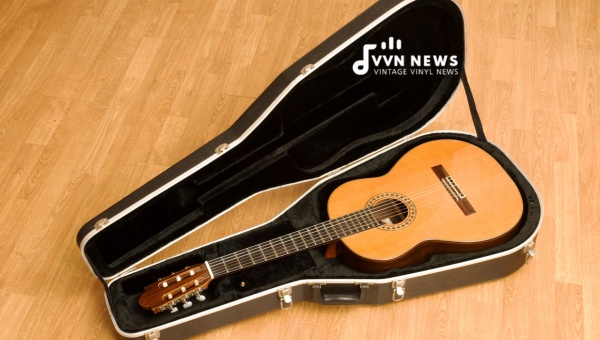To every guitarist, their instrument is more than just wood and strings. It is a vessel that transports artist and listener into a world of melody and passion.
That’s why it’s so crucial to understand the basics of general guitar maintenance & care.
Regardless of whether you’re strumming on a vintage Gibson or a beginner’s Yamaha, proper attention to your six-stringed companion can keep the music flowing and avoid any surprise breaks, cracks, or warps that could interrupt your rhythmic journey.
But here’s the deal: I know that taking care of your beloved guitar may seem like one task too many on top of learning notes, mastering chords, and perfecting songs.
Performing routine maintenance on your guitar isn’t as burdensome as you might think; it’s relatively simple.
By the time you finish reading this article on guitar maintenance and care, you’ll have an arsenal of tips that are not just easy to implement but will expand the lifespan of your musical soulmate dramatically.
General Guitar Maintenance & Care

As guitarists, whether beginners or seasoned pros, we must take good care of our instruments.
It helps improve playability, tonality, and the overall lifetime of your guitar. These steps are straightforward and should become a regular part of your routine.
Keep Your Guitar Clean
An essential part of guitar maintenance is keeping it clean. Our fingers leave behind oil, sweat, and dirt that can affect the strings’ lifespan and your guitar’s wood finish.
Clean the Body: Use a dry cloth to wipe down the body after each playing session. Invest in specialized guitar polish for deeper cleaning, which will help maintain the shine without harming your instrument’s finish.
Clean the Strings: You should also use a string cleaner – run it up and down all strings after playing for better tonality and extended string life. Your music will thank you!
Change Your Strings Regularly
How often you change your strings can depend on numerous factors, like how often you play, how vigorously you strum, and even where you live because humidity influences corrosion rate.
But as a general rule of thumb:
- Hobbyist players should consider changing their strings every 3 to 4 months.
- Regular players or gigging musicians may need to change strings every month.
- Heavy-duty players might consider weekly changes due to their intense playing sessions.
Change isn’t just about freshness – new strings produce better sound quality!
Remember, though, changing all six lines at once might feel daunting at first but over time, it becomes second nature. Not sure how to change them? Find countless tutorials online for step-by-step guidance.
Also Read: 25 Best Guitarists Of All Time [String Masters Who Shaped Music]
Store Your Guitar in a Suitable Case or Gig Bag

For many, a guitar feels like an extension of oneself – understandable why we’d want ours within arm’s reach at all times.
But leaving your guitar out in the open can lead to damage from accidental bumps, knocks, and even dust accumulation. Find the right case or gig bag for your musical partner.
A Hard Case offers maximum protection against physical damage. They’re designed to cushion against both significant impacts and minor daily wear and tear.
Conversely, Gig Bags are lighter and portable, making them fantastic for city dwellers who gig around town or travel heaps by foot or public transport.
Maintain Proper Humidity Levels
Humidity levels significantly affect your prized possession; too dry environment can cause the wooden structure to shrink and crack, while excessive dampness can lead to warping.
A simple way to check humidity levels is with a hygrometer; ideal temps sit between 40-60%.
If it falls on either side, consider investing in a humidifier for dry weather or a dehumidifier for damp environments.
Also, remember that sudden temperature changes are equally harmful because guitars need time to adjust to climatic shifts – so store safely away from heating vents/fireplaces or icy cold rooms.
Wipe Down the Fretboard After Playing
Fingertip sweat is acidic, which corrupts strings over time; it dulls tone and reduces the longevity of both strings and frets.
So please wipe down your fretboard after each session, preferably with either dry cloth or specially designed fretboard conditioners/oils like lemon oil, which protect against drying out.
An annual deep cleaning is also wise – there are many videos as guidance.
Check And Tighten Hardware And Screws
Loose hardware can lead to sound issues such as sound degradation. So once a month, manually check every screw, knob & jack on your acoustic/electric beauty.
- Screws on the pickup selector switch and the input jack
- Knobs (volume and tone) to be tight but not overly squeezed
- Tuning machines also need regular checks. Just ensure they can do their job nice and smooth without any hiccups
If anything feels loose, tighten gently with an appropriate-sized screwdriver that fits the specific size of your hardware screws.
Just don’t over-tighten to avoid stripping the threads or cracking the wood.
Combining these tips will undeniably add years to your guitar’s lifespan while delivering smooth playing experiences and heartwarming melodies.
Also Read: 15 Richest Guitarists In The World [Rock Stars Making Bank]
Protect Your Guitar from Extreme Temperatures
We often forget that guitars are delicate creatures susceptible to weather changes.
Exposure to high heat or freezing temperatures can cause the wood to expand or contract, resulting in tuning issues, warping, fret buzzing, and more.
When transporting your guitar in cold weather, be sure it’s well-insulated. If left in a heated car during the summer, open the case occasionally to let it breathe and cool down.
Also important is considering the temperature of your jamming space – if room temperature is uncomfortable for you, it’s likely stressful for your guitar, too.
Use a Guitar Stand or Hanger for Storage
Storing your guitar correctly can seem like an afterthought, but it is vital for its healthiness.
Stashing your guitar on a couch or bed may seem fine, but accidents happen, and repairs are expensive – best not to risk it!
Strategically placing your guitar on a dedicated stand or hanging it on a hanger will significantly reduce the chances of accidental damage.
Guitar stands to add charm to any practice room since they ‘show off’ your instrument beautifully yet comfortably.
At the same time, hangers offer added safety for kids & pets by keeping your cherished device out of easy reach.
Before buying a stand, ensure its padding won’t react with your guitar’s finish. Investing time and money in finding a suitable frame will surely provide you with long-term peace of mind.
Avoid Exposing Your Guitar to Direct Sunlight
Direct sunlight might accentuate how gorgeous your guitar looks, but continuous exposure can wreak havoc!
Intense heat could lead to cracks and fading finish over time, an eyesore nobody wants.
If unavoidable circumstances lead to sun exposure, move the guitar as soon as possible and use shadow areas so direct sun doesn’t weaken its lifeblood – wood & glue holding everything together.
Also Read: 20 Best Eq Pedals For Perfect Tone [Shape Your Guitar Sound]
Inspect and Clean Your Guitar’s Electronics
Nothing frustrates you like a scratchy sound disrupting your perfect solo act, and believe me, it’s generally the result of dirty electronics.
Depending upon your guitar’s type – acoustic or electric – the electronics in question would be different, but inspection & cleaning remain important regardless.
For electric guitars, check the pots, switches, and jacks regularly. If you notice crackling sounds while adjusting controls, it’s time to clean them using an electronic cleaner (like DeoxIT).
It’ll remove dirt and corrosion, improving contact & conductivity so you rock without interruption.
Acoustic guitars with pickups should be inspected for cuts/cracks in wires or rust building up. Simply cleaning these through an air duster can make a significant difference.
FAQs About Guitar Maintenance & Care
Why should I clean my guitar regularly?
Regular cleaning helps maintain the instrument’s visual allure, prevents damage from dust and grime buildup, and extends the lifespan of the strings.
What happens if I don’t regularly change my guitar strings?
Not frequently changed strings will lose their timbre and make your guitar sound lifeless. Damaged or corroded lines can also lead to potential injury.
How can I ensure my guitar room or storage is properly humidified?
You can use a room humidifier or a particular guitar case humidifier. Ideally, maintain a relative humidity level between 45% – 55% for optimal instrument protection.
What could happen if I left my guitar in direct sunlight?
Prolonged exposure to direct sunlight can lead to warping or cracking of the wood, fading of the finish, and potential damage to the terminal electronics.
Why should I never store my guitar near a heat source?
Extreme heat can cause warping and cracking of the wood, loosening of glue joints, and other significant damages that may drastically affect the instrument’s performance.
Conclusion
Maintaining your guitar boils down to five vital points: keep it clean (incl. strings), always be watchful of humidity, handle it with care always, replace worn-out lines promptly, and ensure it’s secure in a reliable case or on a guitar stand.
These critical steps may seem elementary, but they’re the bedrock that will secure your guitar’s longevity and uphold its sound quality.
As you embark on your musical journey with your much-loved six-stringed companion, remember – a well-maintained guitar makes for happy tunes and an even happier guitarist.








